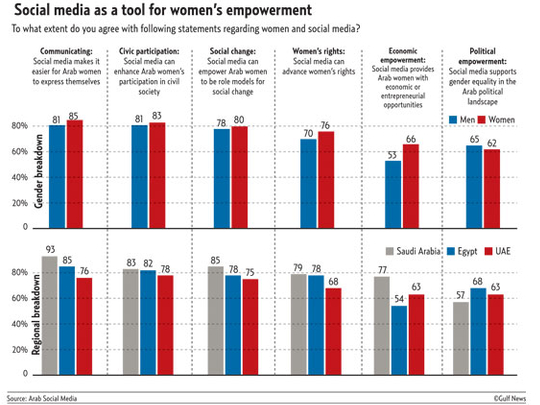
Dubai: The Arab Spring has provided a platform to the unsung heroes of the Arab world. Women have always been behind-the-scene participants in the old order of Middle Eastern politics. With the rise of social media, women are finally coming out of their cocoons and taking centrestage in shaping the new geo-politics of the Middle East.
One of the most groundbreaking events of the year was the announcement of the Nobel Peace Prize to the first Arab woman — Yemeni national Tawakul Karman, a human rights activist who is known among Yemen's opposition as the "mother of the revolution".
Pictures of women in Tunisia, Egypt, Syria and Yemen taking to the streets and demanding change have also dominated the media.
Two prominent examples in the second half of 2011 of women utilising social media to catalyse change within their communities and countries are Saudi Arabia's "Women2Drive" campaign and Egypt's HarassMap initiative.
Useful tool
Meanwhile, the third edition of the Dubai School of Government's Arab Social Media Report highlights the trend of women's increasing presence in social media. It tackles the issues of a "virtual" gender gap, whether Arab women perceive social media as a useful tool, and if this alternative media can potentially increase women's civic participation.
The report found that women in the Arab world constitute only a third of Facebook users, despite the fact that Arab women have been active on social media sites across the region throughout the Arab Spring.
During the study that was conducted between April and October among 469 respondents, social media users attributed the "virtual" gender gap to societal and cultural limitations, privacy and security issues, information and communications technology (ICT) literacy, in addition to the availability of "relevant content" for women.
Saudi Arabia (where women's presence in social media accounts for 31 per cent) believed that societal restrictions were a main factor in limiting women's presence in social media outlets as family barriers are placed on women.
Women having less trust in online security was the second factor for the gender gap, with the UAE topping the list at 17 per cent.
‘Surprising findings'
"One of the surprising findings is that men and women from across the region in all countries view social media as a platform to empower women," said Fadi Salem, Director, Governance and Innovation Programme, Dubai School of Government.
While the top two uses of social media were for the purpose of raising awareness and spreading information about events related to uprisings and revolutions, a slightly larger percentage of men than women used social media for these purposes. Although this was the lowest ranking use of social media on a regional level, a larger percentage of Arab women among respondents said that they used social media to manage activists.
The use of social media during the uprisings in Egypt and Saudi Arabia showed that it was mainly being used to raise awareness on the causes of the revolutions, at 35 per cent and 25 per cent respectively. When organising political activities, 62 per cent of Egyptians and 50 per cent of people in the UAE used social media for such events.
- Facebook has seen an exponential growth in the Arab region, growing by over 68 per cent in less than a year since January.
- Female participation in Facebook usage remains low, at 33.5 per cent as compared with the global female percentage of users at about 50 per cent.
- n With Facebook, the UAE remains at the top of the Arab region. Kuwait is the only other GCC country in the top five, with Lebanon, Jordan and Tunisia in the remaining spots.
- Egypt still constitutes about a quarter of total Facebook users in the Arab region, and has added more users in the past year than any Arab country, at over 4 million new users between January and October 2011.












